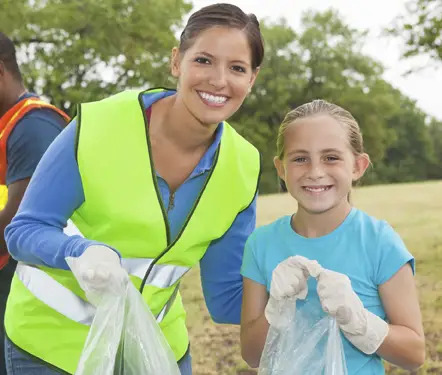Getting involved in your community is a great way to find the support you may need from your nearby neighbors while showing your young children the importance of volunteering. The executive director of the JCC Mid-Westchester and a mom of two shares why families should volunteer and donate time to those who need it most.
I am a big believer in modeling behavior for children. My guidepost for many years has been the lyrics of the Stephen Sondheim song, “Children will Listen”:
“Careful the things you say, children will listen. Careful the things you do, children will see. And learn…Children will look to you for which way to turn, to learn what to be.“
 When your children see you volunteering your time at their school, they integrate you as an adult and a parent into their environment. They may not express it but they are proud that you are there with them and their friends.
When your children see you volunteering your time at their school, they integrate you as an adult and a parent into their environment. They may not express it but they are proud that you are there with them and their friends.
As a teenager at BBYO leadership training camp, I learned to lead by example. When I thought my children should participate in post-Hurricane Sandy clean up, I signed up the whole family to go on a school bus to assist the devastated communities. Family civic engagement, often with different programs for teens, is quite powerful as the shared experience provides opportunities for ongoing discussions about the particular issue.
When my girls were younger, we would go out in the evenings to meetings at their school, our synagogue, or at other community organizations they would ask me what we discussed at these meetings. I would answer them in age-appropriate language and explain one or two agenda items that I thought would have meaning for them or that would provide a teaching moment.
My involvement in community organizations often translated into making my children feel more comfortable when they attended events at those organizations because people knew me and made them feel welcome.
Even reading the newspaper and discussing civic issues helps children to see that you as a parent are engaged and knowledgeable in the world around them. These types of conversations help them to transition their world view beyond their own lives to the greater community.
In the long run, studies have found that children whose parents model civic behavior are more likely to exhibit positive civic behavior when they are older. So not only are you helping children grow and develop in their childhood, you are also planting deep roots for future civic participation.
Karen Kolodny is the executive director of Jewish Community Center of Mid-Westchester, a nonprofit organization dedicated to enriching the community by providing cultural, social, educational, and reacreational and fitness programs, and Jewish identity-building opportunities to people of all ages.
Kolodny has certificates from New York University in arts administration and business technology. She earned her bachelor’s in civil law and common law from McGill University and a master of law from Cambridge University. She lives in NYC with her husband and two teenage daughters.
Kolodny’s colleagues Julie Dorfman, Nancy Kaplan, and Penny Randall, who play essential roles in various departments, including the JCC Mid-Westchester’s Early Childhood, Special Education and Services, and Family Center, contributed to this article.












